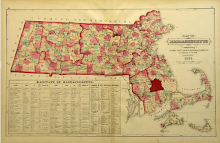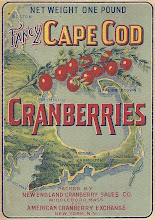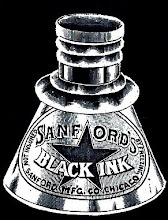Showing posts with label religion. Show all posts
Showing posts with label religion. Show all posts
Wednesday, November 22, 2017
What would the Pilgrims have Thought?
This tidbit from the Brockton Enterprise of August 24, 1912 indicates that the cranberry truly was king in Middleborough, the harvest that year even postponing a traditional local meeting of churches.
"There isn't going to be a meeting of the Plymouth County neighborhood convention of the churches next month because of cranberries.
"That sounds rather strange, but Gen. Sec. A. H. Wardle of the [Middleborough] Y. M. C. A., who is secretary of the convention, announces this to be the reason for missing the September meeting.
"Ordinarily the sessions are resumed in September after the vacation period, and it was expected the same custom would be in effect this year....
"But it didn't happen. The active members of these churches are so busy gathering up cranberries, which literally translated means money, that they can't stop to entertain church delegates, Mr. Wardle states, so the meeting will go over till October.
"It is said to be the first time the convention failed to resume its meetings in September, and the reason assigned is considered a very unusual one."
Source: Brockton Enterprise, "Cranberry is King, Religious Convention is Postponed", August 24, 1912.
Friday, April 2, 2010
Good Friday
 Despite the growing number of Catholics in Middleborough for whom Good Friday remained an important religious day during the late 19th century, it was not recognized by the public schools until 1902 when Middleborough High School closed in the afternoon
Despite the growing number of Catholics in Middleborough for whom Good Friday remained an important religious day during the late 19th century, it was not recognized by the public schools until 1902 when Middleborough High School closed in the afternoonThe Catholic and Episcopal scholars at the high school [in Middleborough] were dismissed at noontime Good Friday, as were the other members of the school. This is the first time that Good Friday was recognized in the public schools.
Source:
Boston Daily Globe, March 29, 1902.
Boston Daily Globe, March 29, 1902.
Thursday, September 24, 2009
Cranberry is King
 So important was the annual autumn cranberry harvest locally that it had the influence to disrupt Middleborough and Lakeville schools and postpone religious functions so that residents could lend themselves to the task of picking berries. During the 1912 harvest season, the pervasive demand for pickers throughout southeastern Massachusetts led to the cancellation of the Plymouth County Neighborhood Convention, a local gathering of Protestant churches, a development reported in the pages of the Brockton Times on August 24, 1912:
So important was the annual autumn cranberry harvest locally that it had the influence to disrupt Middleborough and Lakeville schools and postpone religious functions so that residents could lend themselves to the task of picking berries. During the 1912 harvest season, the pervasive demand for pickers throughout southeastern Massachusetts led to the cancellation of the Plymouth County Neighborhood Convention, a local gathering of Protestant churches, a development reported in the pages of the Brockton Times on August 24, 1912:CRANBERRY IS KING.
Religious Convention is Postponed.
There isn't going to be a meeting of the Plymouth County neighborhood convention of the churches next month because of cranberries.
That sounds rather strange, but Gen. Sec. A. H. Wardle of the [Middleborough] Y. M. C. A., who is secretary of the convention, announces that to be the reason for missing the September meeting.
Ordinarily the sessions are resumed in September after the vacation period, and it was expected the same custom would be in effect this year ....
But it didn't happen. The active members of these churches are so busy gathering up cranberries, which literally translated means money, that they can't stop to entertain church delegates, Mr. Wardle states, so the meeting will go over till October.
It is said to be the first time the convention failed to resume its meetings in September, and the reason assigned is considered a very unusual one.
Illustration:
"Cranberry Picking on Cape Cod", postcard, early 20th century
"Cranberry Picking on Cape Cod", postcard, early 20th century
Cranberry pickers at Middleborough (like those depicted on this postcard of nearby Cape Cod) were in high demand each September and October, so much so that in 1912, the Plymouth County Neighborhood Convention had to be postponed until the close of the harvest season. Here, the pickers are seen working in staked rows, the typical manner for hand-picking.
Source:
Brockton Times, "Cranberry is King", August 24, 1912.
Monday, September 7, 2009
Church Membership, 1840s
 Up through the 20th century, local evangelical Protestant churches maintained a relatively rigid control over their membership. Worshippers desirous of joining a particular church were vetted by a council of church members who evaluated the applicant's suitability, sincerity and religious views, and decided whether the applicant could be a member. When a member wished to relocate and join another church, they were expected to apply for dismissal in the same manner, which the governing body of the church would either grant or not grant.
Up through the 20th century, local evangelical Protestant churches maintained a relatively rigid control over their membership. Worshippers desirous of joining a particular church were vetted by a council of church members who evaluated the applicant's suitability, sincerity and religious views, and decided whether the applicant could be a member. When a member wished to relocate and join another church, they were expected to apply for dismissal in the same manner, which the governing body of the church would either grant or not grant."Individuals become members of the church, on application, and on giving evidence of the above named qualifications [such as conversion], by election…. A person believes he is converted, and, as is common with those truly converted, he desires to join the church. He expresses his wish to a member of the church, who proposes him. Or some member believes him converted, and suggests that it is his duty to join, and, with his consent, proposes him. He then appears before the church, and relates his Christian experience. Any member proposes such questions as seem suitable to obtain an understanding of his views. He then retires, and if no member objects to him, he is elected to come into full membership…. It is the duty of all members removing from the vicinity of the church, to take letters of dismission to other churches of the same denomination.” [Haynes: 227, 230].
While the practice may appear strict, members were understood as entering into a solemn covenant with both God and each other. Consequently, joining or leaving a church were decisions not to be undertaken lightly and were to have the full consideration of the church.
It was within this context that Maria Otis Alden of North Middleborough asked to be dismissed from the North Middleborough Congregational Church in late 1849. Miss Alden, the youngest child of Job and Lydia (Shaw) Alden of Middleborough, had joined the North Middleborough church on January 8, 1843, at the age of 27 in the company of several other Middleborough residents in a general revival which had commenced earlier the previous year. Apparently, over the course of the following few years, Miss Alden became dissatisfied with and "alienated" from the church, so much so that on November 15, 1849, she wrote a letter to Reverend Philip Colby, pastor of the church, applying for dismissal. Her failure to provide the North Middleborough church with either the reasons for her request, or the name of the church she proposed to join following her dismissal, prompted a reluctance on the part of the church to grant her request. Subsequently, Colby, penned the following letter to her in an effort to convince Miss Alden to be more forthcoming with her reasons for requesting a dismissal:
No. Middleboro', Nov. 19th. 1849.
My dear Friend,
Your letter of the 15th inst. I just received. I laid your request for a dismission &c. before the church immediately after I received it. The ch'h voted to lay it on the table - ready at any time to be called up.
 I expected that you would of course, call upon me to know the result of your application, in which case I could have had opportunity to explain or advise, if advice was sought, and I was competent to give it.
I expected that you would of course, call upon me to know the result of your application, in which case I could have had opportunity to explain or advise, if advice was sought, and I was competent to give it.The church probably considered the solemn covenant obligations they were under to you, to watch over you for your best good, incompatible with granting your request to be dismissed without giving any reasons, and to go, no-body could tell where - as your request was to "go where you pleased".
I am not aware that any church of Christ is accustomed to dismiss and recommend their members in so loose and indefinite a manner as this.
Some good reason or reasons should be given; and the church should have a pledge, as far, at least, as the selection of some ch'h unless in case of going abroad to reside and then an evangelical denomination should be named - that the dismissed member will become connected with an evangelical church.
I am ever ready to attend to any suitable request in your case, as well as that of any other member. And will have your original request call[ed] up, at a suitable time, if you persist in it. But, do not know that it would be of any use unless you will appear and offer reasons, and designate some church which you wish to unite with, and be under their watch and care.
As you live among us, and are under covenant engagements to worship and commune with us, it seems to me that you had better review the matter and consider it prayerfully and thoroughly before you leave the fold into which you united with the most solemn vows.
At the same time, as far as my own feelings are concerned - and I speak here only for myself - but have no doubt I speak the language of the church - I feel and act upon the broadest principles of true liberality and charity.
I have been pained at your apparent alienation, and the course you pursue and am not aware of any occasion I have given for it. I hope as an heir of the grace of[torn] you will exercise that charity which hoping all things - and yet remain in harmony with us: and that your path may be "like the shining light that shineth more and more to the perfect day." -
Very affectionately, yours truly.
Philip Colby
 Following the receipt of this letter, Miss Alden appears to have met with Colby to explain her reasons, for on record is her dismissal from the church dated November 30, 1849, "to Evangelical Church her choice."
Following the receipt of this letter, Miss Alden appears to have met with Colby to explain her reasons, for on record is her dismissal from the church dated November 30, 1849, "to Evangelical Church her choice."Illustrations:
Rev. Philip Colby to Miss Maria O. Alden, letter dated at North Middleborough, MA, November 19, 1849.
The letter which Colby wrote Maria O. Alden regarding her request for "dismission" from the congregational church at North Middleborough.
Rev. Philip Colby to Miss Maria O. Alden, letter dated at North Middleborough, MA, November 19, 1849.
The first page of Colby's letter displays his fine legible hand. In the letter, he writes to persuade Miss Alden to reveal her reasons for requesting a dismissal from the North Middleborough Congregational Church.
Signature and Seal, Rev. Philip Colby
Colby (1779-1851) served as the pastor of the North Middleborough Congregational Church from 1816 until his death in 1851.
Sources:
Letter, Rev. Philip Colby to Miss Maria O. Alden, North Middleborough, MA, dated November 19, 1849 (author's collection).
Emery, S. Hopkins. The History of the Church of North Middleborough, Massachusetts. Middleborough, MA: Harlow & Thatcher [printers], 1876.
.
Haynes, D. C. The Baptist Denomination: Its History, Doctrines, and Ordinances. New York, NY: Sheldon, Blakeman & Co., 1856, pp. 227, 230.
.
Townsend, Charles D. History of North Congregational Church, United Church of Christ, North Middleborough, Massachusetts. Sarasota, FL: Aceto Bookmen, 1982.
Wednesday, July 29, 2009
Isaac Backus and Religious Freedom

The role of the Reverend Isaac Backus (1724-1806) of North Middleborough as founder of the First Baptist Church of Middleborough, Baptist theologian and historian, and spiritual leader of southeastern Massachusetts' Baptist community has been well documented. Less well known are the contributions Backus made to the advancement of American civil liberties during the Revolutionary period of our history.
A one-time devout adherent of Congregationalism, Backus was a conciliatory man who tried to heal the clefts of religious division he saw opening all about him. Despite his sponsorship of the Baptist faith, Backus remained supportive of his Congregational friends and neighbors and felicitous of their well-being, while speaking out for "Liberty of Conscience" for all faiths.
The defining episode in Elder Backus' development as a religious libertarian was undoubtedly the imprisonment of his widowed mother in Connecticut "for adopting religious sentiments contrary to law," and ever afterward Backus would remain a staunch defender of the rights of religious dissenters.
Backus was an ardent spokesman for the principle of religious tolerance, arguing that "the imposing of religious tests hath been the engine of tyranny in the world." He coupled the ideal of religious liberty with that of political freedom, and articulated this view in several of his many published pamphlets and sermons, including "A Plea for Liberty of Conscience" (1770), "An Appeal to the Public for Religious Liberty Against the Oppressions of the Present Day" (1773), and "True Policy Requires Equal Religious Liberty" (1779).
In 1774, Backus represented the Warren Association of Separate Baptist Churches' interests before the first Continental Congress, where he was a vocal advocate of religious tolerance and the separation of church and state. To the Baptists, it seemed unreasonable "that they should be called upon to contend for civil liberty if after it was gained they should still be exposed to oppression in religious concerns, when, therefore, the first Continental Congress met in Philadelphia, the Warren Association sent Mr. B. their agent to the convention there to procure some influence in their favor; but their efforts were unavailing; they were told they might as well attempt to change the course of the sun in the heavens as to try to effect a change in their measures respecting religion."
Backus' views were decidedly forward-thinking and, though at times they brought suspicion upon him and cast his patriotism into doubt by others, he was to reiterate them unflinchingly on numerous occasions, including before both the Massachusetts State Constitutional Convention in 1779, and the state convention to adopt the Federal Constitution in 1787.
Sadly, Backus did not live long enough to see the acceptance of religious tolerance for all as a foundation stone of democracy. It was not until the 1830s that the famous Dedham case disestablished Congregationalism in Massachusetts as the "state religion" and established, in principle, religious liberty and tolerance for all faiths, a cause for which Backus had labored his entire adult life.
Though Backus died long before this outcome, his life was full of purpose and continues to provide us with hope. As his epitaph in the Titicut Cemetery at North Middleborough reads: "His zeal and persevering industry in the cause of civil and religious liberty through a long, laborious life is still manifest ... "
For more information see:
Alvah Hovey, A Memoir of the Life and Times of Rev. Isaac Backus (Boston: Gould and Lincoln, 1858).
This is the earliest comprehensive biography of Backus. Since its publication, numerous biographies and treatises on Backus' life and work have been published.
Illustration:
Elder Isaac Backus (1724-180), engraving, late 18th century.
Backus was Middleborough's passionate spokesman for the cause of religious tolerance. His life's purpose was the establishment of religious liberty for all faiths, a cornerstone of American democracy.
Subscribe to:
Posts (Atom)























+of+Smoky+Mountains+018.jpg)